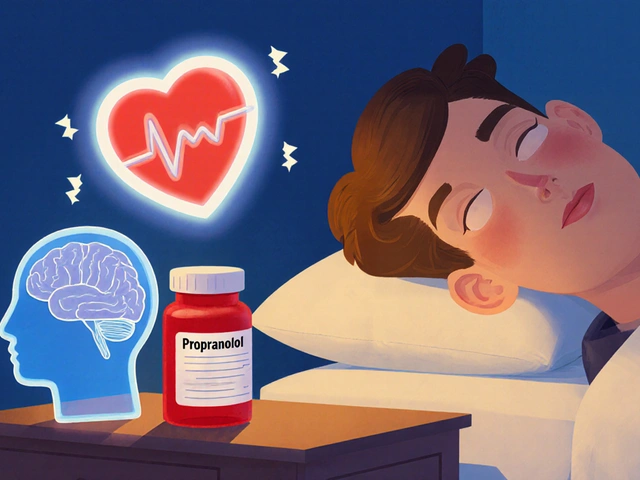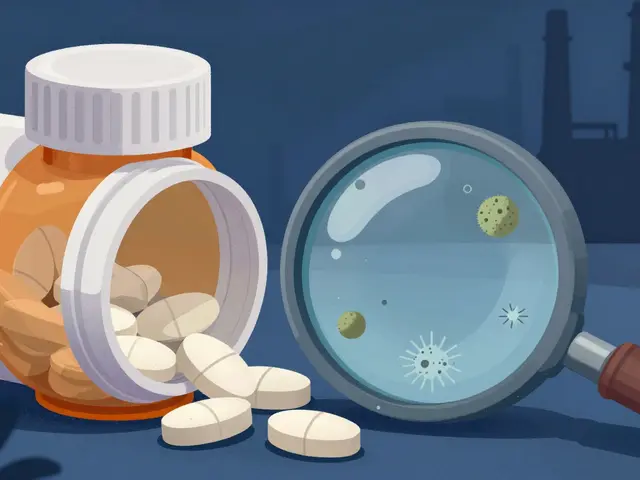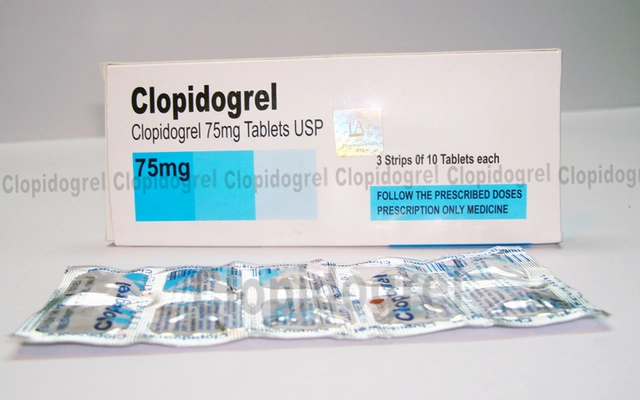 1
Aug,2023
1
Aug,2023
Understanding Mefenamic Acid: Its Basics and Role in Medicine
Now, if you're anything like me, you might raise an eyebrow at the mere mention of something as esoterically named as Mefenamic Acid. I'll raise my glass of a fine Aussie Shiraz and toast to your inquisitive nature because taking an interest in such medical terminologies is not just fascinating; it's one step closer to understanding the wizardry that is modern medicine. So, let's dive into it!
Mefenamic acid belongs to a class of non-steroidal anti-inflammatory drugs (NSAIDs). Lovingly called "Mef" among medical practitioners, it is a drug that has a long history of reducing inflammation and pain, primarily used during menstruation. In my life, this little wonder chemical also helped my cousin ease her severe menstrual cramps. Picture me, with my characteristic grin, handing her the pillbox like a knight presenting his shield to a damsel. But of course, this is not a fairy tale, and every magic potion comes with its share of potential side effects and complications.
Turning the Page: Mefenamic Acid against Cancer
Now, talking about Mefenamic acid's role in fighting cancer is like walking on a tightrope. Don't get me wrong – I've enormous faith in science. However, the relationship between Mef and cancer is tricky and largely viewable through a magnifying lens. Previous studies suggest that mefenamic acid has anticancer effects. Specifically, it is believed to kill cancer cells, slow down their growth, and stop them from spreading. Honestly, I find this possibility as enthralling as watching a kangaroo baby take its first leap.
Interstitial pause - let’s dispel some potential confusion. This doesn’t mean that you should start downing Mef by the handful if you suspect cancer. In the fight against cancer, Mefenamic Acid is only a part of an integrated therapeutic approach, at best, and today the scientific community is still processing its potential power. Remember, Cancer is a crafty opponent, and shooting arrows in the dark might not topple it; instead, it might boomerang back with unforeseen implications.
Perception of Risk: Side Effects of Mefenamic Acid
We've established that Mefenamic Acid is a bit of a superhero in the medical world, but like every superhero, it has its weaknesses, i.e., potential side effects. Nothing we do comes without risks, whether it's stepping outside in Melbourne's unpredictable weather or swallowing a Mef tablet. Some of the known side effects include nausea, heartburn, or dizziness. Seriously, that sounds similar to a night of heavy drinking!
The risk factors do not stop at an upset stomach or spinning room. Some serious (although rare) adverse effects include rash, easy bruising/bleeding, or even signs of kidney problems. With this information, I feel like that friend who tells you the potential fallout of a night out, but with science backing me up. Remember, it's crucial to consider the potential side effects while sizing up the potential benefits of Mefenamic acid.
Harmony of Knowledge: The Dosage Dilemma
The dosage of Mefenamic acid is a balancing act, as crucial as balancing a bottle of beer on your forehead during a frat party. A typical dosage might start from 250 mg to 500 mg, don't try to be a doctor yourself (unless you are one, in which case, please drop me some tips!). Regular health check-ups and regular dosage as per your practitioner's recommendation is all the wild fun you should be having with Mefenamic acid.
Also, it's not a drug you can indiscriminately use for all and sundry. If you have heart disease or kidney problems, it's more off limits to you than a Vegan barbecue at my place. Beware, my dear reader, while Mef can be your saviour with its manifold properties, playing with the dosage might land you in dire straits.
Mefenamic Acid and Cancer: Unravelling A Complex Relationship
It's 2023, and we're in an age where we're landing rovers on Mars, but we're not ready to announce Mefenamic acid as a dedicated anticancer drug. Sure, we've seen promising results in preclinical trials, even comparable to the amazement I encountered when I first saw a kangaroo leaping taller than me. But these results have yet to pass the stringent safety and efficacy tests before Mefenamic acid can be bannered as an anticancer drug.
So does that mean Mefenamic acid is not useful for cancer patients? Not really. Recent studies show that Mefenamic acid might be effective in some cancer types over others, indicating that this drug's story is far from over. In the ever-evolving world of medical research, where yesterday's miracle may become today's cautionary tale, and today's cautionary tale may become tomorrow's miracle, we can't predict what Mefenamic acid's final role may be.
Conclusion: A Maverick’s View on Mefenamic Acid and Cancer
Despite the potential risks and unpredictable efficacy, this seemingly odd bond between Mefenamic acid and cancer doesn't look like it will break anytime soon. Whether or not Mefenamic acid will be a noteworthy contributor to modern oncology, it certainly has been pushing the envelope in cancer research. Funny to think that a simple NSAID used primarily for menstrual pain might reinvent itself as a cancer-fighting agent, isn't it?
Similarly, whether you'll walk away from this article with a deep appreciation of Mefenamic acid or a mild amusement at the complexities of the human body, I am darn sure you'd think twice before undermining the potential of any medical drug, let alone mefenamic acid, the next time you grab a painkiller for relief. As my friends and I often say after a detailed discourse on medical advancements over a pint (or two), "It's a crazy, interconnected world in there."






Thanks for breaking down the basics of mefenamic acid; it’s helpful to see the balance of risks and potential anticancer effects laid out so clearly.
While the therapeutic window of mefenamic acid is indeed narrow, clinicians must carefully evaluate renal function and gastrointestinal tolerance before considering off‑label oncologic applications.
Imagine a world where a humble NSAID could double as a silent assassin against rogue cells-this is the thrilling narrative emerging from recent in‑vitro studies. Researchers have observed that mefenamic acid can inhibit COX‑2 pathways, thereby stalling tumor angiogenesis. Moreover, its capacity to modulate the NF‑κB signaling cascade adds another layer of anti‑proliferative action. Yet, these findings are largely confined to cell cultures and murine models, leaving a vast translational chasm. It is crucial for the scientific community to conduct rigorously designed clinical trials before embracing such optimism. Until then, the drug remains a promising adjunct, not a standalone cure. Let us continue to support collaborative research, for only through collective effort can we unveil the true potential of this compound.
Oh sure, “thanks for breaking it down,” because we all needed a gentle reminder that NSAIDs can double‑tap cancer cells-🙄
gotta say mef ain’t no magic pill dont just pop it hoping for cancer cure
From a pharmacodynamic perspective, the inhibition of prostaglandin synthesis by mefenamic acid may synergize with checkpoint inhibitors, thereby potentiating immunogenic cell death pathways-a prospect worthy of mechanistic exploration.
🦘💥 Picture this: a tiny molecule doing a high‑flyin’ somersault over malignant pathways, the kind of cinematic showdown we’d love to see on the big screen! The pre‑clinical data paints a portrait of mefenamic acid as a versatile combatant, striking at COX‑2, NF‑κB, and even influencing apoptotic cascades. Yet, the narrative remains unfinished, with human trials still awaiting their cue. 🌟 Let’s keep the dialogue alive and watch this subplot evolve.
It is imperative to acknowledge, with the utmost linguistic precision, that the extant literature regarding mefenamic acid’s oncological applications suffers from a paucity of randomized controlled trials, thereby rendering any extrapolation to clinical practice premature; consequently, physicians must eschew hyperbolic assertions and adhere strictly to evidence‑based protocols, whilst patients should remain vigilant for adverse events such as gastrointestinal ulceration, renal impairment, and hematologic anomalies, all of which necessitate diligent monitoring throughout therapeutic regimens.
Indeed, the metaphor of a "high‑flyin’ somersault" captures the imagination, though we must temper enthusiasm with the rigor of empirical validation before declaring triumph.
While the potential of mefenamic acid in oncology is intriguing, the current evidense remains insufficient to recommend its routine use; further reserach is essential to determine safety and efficacy.
At the end of the day, every drug is a story waiting to be told, and mefenamic acid’s tale is still being written between the pages of lab notebooks and patient charts.
Sure, tossing jargon around doesn’t make the data any more solid; the so‑called synergy is still speculative at best.
Reading through this deep dive reminded me of the countless evenings I’ve spent poring over pharmacology textbooks, marveling at how a single compound can wear so many hats. First, there’s the well‑documented analgesic role that has brought relief to countless individuals suffering from dysmenorrhea and musculoskeletal pain. Then, the emerging pre‑clinical evidence suggests an ability to interfere with cellular proliferation pathways, a feature that could be a game‑changer in oncology. The anti‑inflammatory mechanisms, primarily via COX inhibition, might also dampen the tumor‑promoting microenvironment, an angle that warrants further investigation. Moreover, some studies hint at a modulation of the Wnt/β‑catenin signaling cascade, which is notoriously implicated in cancer stem cell maintenance. If these pathways are indeed affected in vivo, the therapeutic window could expand dramatically. However, we cannot ignore the reported adverse effects, ranging from mild gastrointestinal discomfort to rare instances of renal toxicity. Patient selection will be crucial; individuals with pre‑existing renal insufficiency might be at heightened risk. Dosing strategies will also need fine‑tuning to balance efficacy with safety, perhaps involving intermittent schedules rather than continuous exposure. Collaboration between oncologists, pharmacologists, and toxicologists will be essential to design robust clinical trials. Funding agencies should recognize the potential translational value and support multi‑center studies. Meanwhile, clinicians should remain cautious, counseling patients that mefenamic acid is not a substitute for established chemotherapeutic regimens. Education on drug interactions is also vital, especially considering the polypharmacy common in cancer care. As we await definitive trial outcomes, the scientific community must maintain a critical yet open mindset. In sum, the journey of mefenamic acid from NSAID to potential anticancer agent is a fascinating exemplar of drug repurposing, and I look forward to seeing how this narrative unfolds in the years ahead.
i think it’s cool but we need more proof before using it for cancer.
Interesting points.
The enthusiasm captured in the previous exposition reminds me of the epic sagas where a humble hero rises to confront a formidable foe, and in this case, the hero is none other than a modest NSAID stepping onto the grand stage of oncology. While the author paints a vivid tableau of potential mechanisms-COX inhibition, Wnt modulation, stem‑cell interference-it is essential to recall that biological systems are notoriously complex, and a single agent rarely accomplishes miracles in isolation. Nevertheless, the call for interdisciplinary collaboration resonates profoundly; when chemists, clinicians, and data scientists converge, the alchemy of discovery accelerates. It is also heartening to see a balanced acknowledgment of toxicity concerns, which, if overlooked, could sabotage the most promising therapeutic avenues. As we stand at this crossroads, let us champion rigorous trial designs, perhaps employing adaptive protocols to swiftly identify responders and non‑responders. In doing so, we honor both the scientific rigor and the hopeful optimism that fuels progress. 🌱
From a linguistic standpoint, the discourse surrounding mefenamic acid exemplifies how scientific communication must navigate the delicate balance between technical accuracy and accessibility, ensuring that both specialists and lay audiences can grasp the nuances of its pharmacological profile without succumbing to misinterpretation.
i feel like we’re just scratching the surface of what mef can do, lol 😊
Oh great, another “miracle drug” that works in a petri dish-just what the world needed 🙃
One could argue that the perceived anticancer potential of mefenamic acid is merely an artifact of off‑target cytotoxicity, lacking specificity and thus rendering it unsuitable as a targeted therapeutic modality.